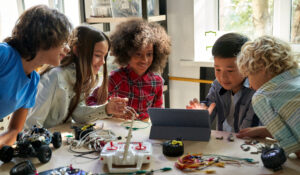As the 2024-2025 school year approaches, it’s crucial for parents and teachers to equip children with essential learning habits that will drive their academic success. Since traditional school systems sometimes struggle to meet the unique needs of every student, some children may need more support. Let’s outline the essential learning habits that can significantly impact your child’s educational journey this year and how Learning Lab’s innovative programs can provide the support they need.
1. Develop Consistent Study Routines
Establishing a regular study schedule is vital for providing the structure children with learning differences need to thrive academically. A consistent routine not only supports better focus and information retention but also helps reduce anxiety by creating a predictable environment.
Here’s how you can manage a consistent study routine:
- Set a Regular Study Time: Establish a specific time each day dedicated to studying to create a habit and make it part of your child’s daily routine.
- Create a Visual Schedule: Use a calendar or planner to outline study sessions, assignments, and breaks. These can help children stay on track and anticipate what’s next.
- Start with Short Sessions: Begin with shorter study periods and gradually increase the time as your child’s focus and endurance improve.
- Mix It Up: Alternate between different subjects or activities to keep your child engaged and avoid monotony.
- Set Clear Goals: Define what needs to be accomplished in each study session, whether it’s completing a specific assignment or reviewing a certain amount of material.
- Stick to the Routine: Consistency is critical. To reinforce the habit, try following the established routine as closely as possible, even on weekends.
- Adjust as Needed: Be flexible and willing to adjust the routine if something isn’t working. The goal is to create a routine that effectively supports your child’s learning needs.
2. Building Cognitive Skills for Long-Term Success
Cognitive skills like memory, attention, and problem-solving are crucial for effective learning, especially for children with learning differences. These skills directly influence their ability to process, retain information, maintain focus, and think critically.
At The Learning Lab, we prioritize the development of cognitive skills through our Neuro Lab, which features the Fast ForWord software. This innovative program is grounded in neuroscience and specifically designed to strengthen the cognitive abilities essential for learning. Fast ForWord works by adapting to each student’s pace, providing targeted exercises that improve memory, attention, processing speed, and sequencing.
3. Focusing on Individualized Learning Paths
Every child learns uniquely, and a one-size-fits-all approach often doesn’t work, especially for children with learning differences. When students receive personalized instruction tailored to their unique learning styles and needs, they become more engaged, confident, and capable of closing significant learning gaps.
At The Learning Lab, we emphasize the importance of personalized learning through our I3 Lab, which stands for Intensive, Individualized Instruction. This lab focuses on creating a learning plan that is tailored to each child’s specific needs, helping them catch up and even surpass their academic goals.
4. Creating a Distraction-Free Learning Environment
A key to academic success is maintaining focus, which begins with creating a distraction-free learning environment. Whether it’s noise from a TV, notifications from a phone, or clutter on a desk, these distractions can prevent a child from engaging fully with their studies.
To help your child focus, consider these tips:
- Create a Designated Study Area: Choose a spot free from distractions, dedicated solely to studying.
- Ensure the Space is Quiet and Well-Lit: Good lighting and a quiet environment help maintain concentration.
- Organize the Study Area: Keep the area clutter-free to reduce stress and improve focus.
- Set Boundaries for Technology Use: Limit distractions by turning off notifications and blocking distracting websites during study time.
5. Incorporating Multi-Sensory Learning Techniques
Every child has a unique way of learning, and incorporating multi-sensory learning techniques can be transformative, particularly for children with learning differences. Multi-sensory learning engages more than one sense at a time—such as sight, sound, and touch—which can help improve understanding and retention of information.
At The Learning Lab, we integrate multi-sensory learning into our various programs and labs, creating a rich, dynamic educational experience tailored to each child’s needs. For instance, our I3 Lab uses hands-on activities, visual aids, and auditory tools to reinforce key concepts and skills. By engaging multiple senses, we ensure that students learn and truly understand the material in a way that sticks.
6. Staying Informed and Engaged Through Educational Resources
Lifelong learning is vital not just for students but also for parents and educators who play a pivotal role in supporting a child’s educational journey. By staying up-to-date with the latest tools, tips, and insights, you can better support your child’s growth and help them navigate any challenges they may face.
At The Learning Lab, we love sharing educational podcast episodes we find valuable. And, of course, you can always check our blog for educational content, tips, and guides on how to continue reinforcing your child’s education journey.
7. Encouraging Regular Breaks for Better Focus and Retention
While a consistent study routine is crucial, integrating regular breaks is equally vital for maintaining focus and enhancing information retention. Continuous studying without breaks can lead to burnout, reduced focus, and lower retention rates. Breaks allow the brain to rest and recharge, making study sessions more productive and effective.
Consider implementing the Pomodoro Technique, a time-management method where your child studies for a set amount of time (e.g., 25 minutes) followed by a short break (e.g., 5 minutes). After a few cycles, a longer break (e.g., 15-30 minutes) can be taken. During breaks, encourage activities that promote relaxation and physical movement, such as stretching, walking, or simply stepping away from the study area.
Prepare Your Child for Success with The Learning Lab
As we look ahead to the 2024-2025 school year, it’s evident that establishing essential learning habits is vital for academic success, particularly for children with learning differences. At The Learning Lab, we’re committed to helping students develop these habits through personalized support, innovative tools, and a deep understanding of each child’s unique needs.
Are you ready to set your child up for success this school year? Explore how The Learning Lab can be your partner in this journey. Our tailored programs are designed to provide individualized instruction and cognitive skill-building that make a real difference in a student’s academic performance and overall well-being.
Visit our website or book a call to learn more about our programs and how we can support your child’s learning journey. Together, we can help your child achieve their full potential.






